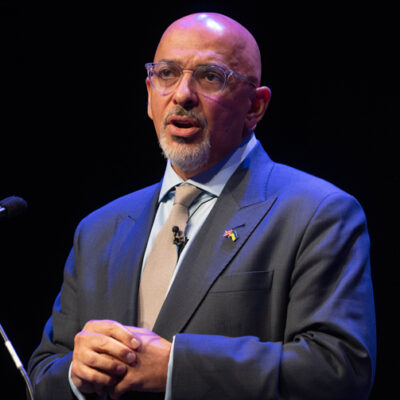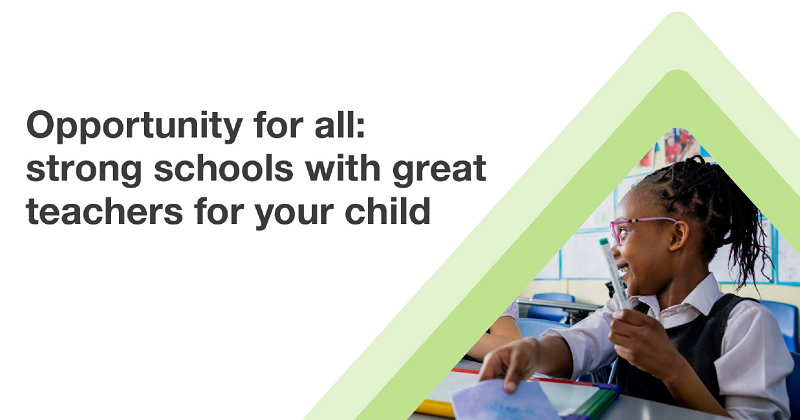The government has today published its schools white paper, titled “Opportunity for all: Strong schools with great teachers for your child”.
Education secretary Nadhim Zahawi said it set out his vision to “introduce and implement standards that will improve children’s education, deliver the right support if they fall behind and give them the tools to lead a happy, fulfilled and successful life”.
The SEND review, out tomorrow, will also feed into this.

However, lots of the policies are not new and have already been announced – so we’ve split our round-up to first set out the new policies, and then the ones we already knew about.
Many of the policies are also slated to be achieved by 2030 – eight years’ time – as the paper “marks the start of a journey towards an education system in which all children benefit from the high standards of the best schools and families of schools”.
Here’s what you need to know…
The two new ‘ambitions’ …
Government has already set a target in its levelling up paper for 90 per cent of children by 2030 leaving primary school with the expected standard in reading, writing and maths, up from 65 per cent currently.
The white paper now sets out a new “ambition” to increase the national GCSE average grade in both English language and in maths from 4.5 in 2019, to 5 by 2030.
There are few more details about the pledge, but the two ambitions will be the “measure of this white paper’s success”.
The NEW white paper policies…
Chapter 1: An excellent teacher for every child
1. Consultation on a new leadership level NPQ for SENCOs, which would replace the National Award in SEN Coordination as the mandatory qualification for all new SENCOs.
2. New scholarship to attract the most talented language graduates and a new ITT course to support more engineers to teach physics.
3. A new digital service will recognise teaching qualifications “from all over the world”.
Chapter 2: Delivering high standards of curriculum, behaviour and attendance
4. A new literacy and numeracy test for a sample of year 9 pupils to “estimate performance at a national level. This will “consist of a short series of digital activities undertaken by a small number of children in school”. More on that here.
5. Legislation to “modernise” rules on recording attendance, with a new “national data solution” which will provide a blueprint for other parts of the system.
6. Legislation to increase Ofsted’s powers to inspect schools that are operating illegally without registration.
7. An expectation that all mainstream schools run a 32.5 hour week by September 2023. Ofsted will check up on schools where it has concerns over education quality and their hours are below the minimum. But this won’t apply to special schools. New guidance will be published in the summer
8. A new network of modern foreign language hubs from 2023, and more effective professional development for language teachers.
9. Updated plans to support sport and music education will be published this year, and a new cultural education plan will come out in 2023.
10. A new careers programme for primary schools in areas of disadvantage and improved professional development for teachers and leaders on careers education.
Chapter 3: Target support for every child who needs it
11. Ofsted will hold schools to account for a new “parent pledge’ – that “any child that falls behind” in English and maths should receive “timely and evidence-based support to enable them to reach their full potential”. Government has “pledged” to make sure leaders communicate this to parents, but, bizarrely, schools are told to do so without “labelling them as ‘behind'”.
12. New guidance on providing catch-up “targeted support”, keeping parents updated and effective assessment for children who have fallen behind will be published in partnership with Ofsted.
13. Tutoring to become a “core academic option in the pupil premium menu” with a “vibrant tutoring market” from 2024. Schools will be expected to use their core budgets, including pupil premium, to pay for support.
Chapter 4: A stronger and fairer system
On academies …
14. A target for all schools to be in strong multi-academy trusts, or have “plans to join or form one”, by 2030.
15. The DfE will “expect” most trusts to work towards serving at least 10 schools or 7,500 pupils.
16. The proportion of schools a trust can run in a particular area will be capped, though no cap will be imposed on trust size overall.
17. A review in May to consider new intervention powers over academy trusts if they fail to meet new statutory standards for being “strong” MATs.
18. Clearer expectations for trusts over providing high-quality, inclusive education, school improvement, financial management, parental engagement and workforce deployment, training and retention.
19. They also face new statutory duties to work collaboratively with other trusts, councils and public bodies, and follow the admissions code.
20. Top-slicing faces new “transparency measures”.
21. In “exceptional circumstances”, good schools may be able to request moving trust.
22. A three-year £86 million pot is earmarked for trust capacity funding, with extra “financial support” for dioceses to launch trust following a pilot.
23. A new CEO development scheme will be open to executive heads and senior trust staff.
24. A consultation, published today, proposes new powers to force “coasting” maintained and academy schools (those with two consecutive Ofsted ratings below “good”) to convert or change trusts.
25. Regional schools commissioners to be rebranded as regional directors.
26. The DfE will “consider” bids for high-quality standalone trust free schools, but “avoid converting schools as standalone academies”.
27. A £40 million fund is promised for 24 “priority” areas among the 55 disadvantaged “education investment areas” to address particular needs, such as literacy, numeracy or absence. These areas will also be targeted for establishing new “academically focused” 16-19 free schools.
28. Legislation will protect faith schools’ “statutory freedoms and protections” on conversion.
29. Pledge to “ensure” selective schools are “secure” in MATs.
30. Government will “discuss with sector” plans for all trusts to have “local governance arrangements for their schools”.
On councils …
31. Councils will get “backstop powers” to force trusts to admit children, and to object to schools’ published admissions numbers. They will take responsibility for in-year admissions, while admissions faces a “new statutory framework” to put children’s needs first and reform over-subscription rules.
32. Councils will be able to launch MATs as expected, but the focus will be “where too few strong trusts exist”. The minister will have powers to mass convert all a council’s schools at their request.
33. A new system of proactive assurance with Local Safeguarding Partnerships commissioning safeguarding audits every three years. This will “help ensure that all schools’ policies are consistent with local safeguarding arrangements and the academy trust standards”.
The policies we already knew about…
Chapter 1: An excellent teacher for every child
This includes a host of already-announced policies. They include 500,000 teacher training and development opportunities by 2024, establishing a flagship Institute of Teaching, and teacher trainers being reaccredited.
Old policies with money attached include the pledge to raise teacher starting salaries to £30k by 2023 and the £3k retention payments for maths and science teachers in disadvantaged areas.
There is also a new relocation premium to help teachers from around the world with visas and other expenses and bursaries for international trainees, which Zahawi announced earlier this month.
Ofsted will also inspect all ITT providers by July 2024, and then every three years after that.
Chapter 2: Delivering high standards of curriculum, behaviour and attendance
Turn Oak National Academy into a new arms-length curriculum body, offering free, adaptable digital curriculum resources and video lessons, free for all teachers.
It commits to no changes to the national curriculum “for the remainder of the Parliament”, and GCSEs and A-levels to remain in place, returning to pre-pandemic grading in 2023.
There’s also the new behaviour guidance, and legislation for a register for children not in school.
Chapter 3: Target support for every child who needs it
The Education Endowment Foundation will be funded with at least £100 million so it can “continue its crucial work to build the evidence base” for “at least the next decade”.
£55 million for the Accelerator Fund to “develop and scale-up the best-evidence literacy and numeracy interventions”. This was announced last year.
















Interesting to see the emphases given to Modern Languages and attracting more engineers to teach Physics. I’d like to see the remit widened to classical languages (Latin, Greek) as well, and for would-be-Physics teachers to maybe have the ability to run with Chemistry. As a retired teacher I’m out-the-loop, but would making tutoring a “core option” confuse students with yet another teaching level (I’m on standby for my local secondary for emergency – stress emergency – one-to-one tutoring)? I look forward to seeing discussions about the other ideas!